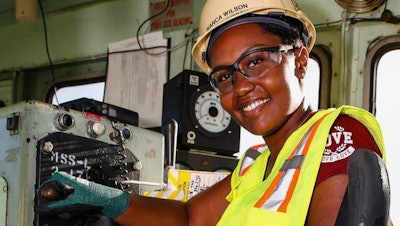 Companies and community colleges are partnering to train future STEM-field workers like Bianca Wilson, shown at the Norfolk Naval Shipyard.
Companies and community colleges are partnering to train future STEM-field workers like Bianca Wilson, shown at the Norfolk Naval Shipyard.
“There is [a] significant shortage of cybersecurity professionals,” says Dr. Dionne Miller, associate dean for academic affairs at LaGuardia Community College (LCC), a City University of New York institution that is launching a cybersecurity training program with Mastercard. “New York labor statistics forecast that there will be 33% growth in this area between 2020 and 2030,” she says, adding, “Collaborations with [companies] enable us to make sure that we are actually preparing students for the careers that they’re aspiring to have.”
Women currently comprise only 13% of registered apprentices. The grants seek to increase the number of women in apprenticeships and are designed to help meet workforce needs in STEM occupations. Registered apprenticeship programs are intended to increase opportunities for workers and to widen the talent pools for employers.
Cybersecurity
LCC works with the New York Jobs CEO Council, a coalition of CEOs, educational institutions, and non-profit organizations in the New York area. The goal of the council is to prepare New Yorkers in diverse, low-income communities for jobs that have high growth potential and pay wages that can move them into the middle class while meeting employer needs.
The New York Jobs CEO Council connected LCC with Mastercard to launch a cybersecurity training program that 20 students will participate in this summer. Following completion of the training program, 10 students will be selected for paid part-time apprenticeships (20 hours per week for two semesters) with Mastercard, during which they will have direct experience in addressing cybersecurity threats as well as receive professional and peer mentoring. Following successful completion, Mastercard may invite apprentices to apply for full-time positions.
“Faculty from our cybersecurity degree program, which is called Network Administration & Information Security (launched in 2016), as well as faculty from our adult and continuing education division, which have expertise in workforce training and development … worked with Mastercard technical professionals in designing the curriculum that would meet the job roles that they identified for the apprentices,” says Miller.
“Even if our students don’t get an offer of employment once they complete their apprenticeship, it will be an invaluable resume-building experience that is going to position them well,” she adds. “This also will [show] larger employers that students at the associate degree level are capable of filling the entry-level roles in the cybersecurity field.”
Miller hopes this program will establish a successful model that can be replicated with other STEM fields. LCC is in the process of forging a similar partnership with a bank for programming and software developers.
Statewide support
The State University of New York (SUNY) system has a robust number of opportunities through the SUNY Apprenticeship Program grant. This encompasses the 30 community colleges in SUNY and some four-year institutions that coordinate with community colleges in their region. Over 150 employers across the state participate, including Beech-Nut Nutrition, Plug Power, Knowles Precision Devices, and Fala Technologies — all companies engaged in work involving STEM fields.
“The individual not only gets the benefit of related instruction ...,” says Johanna Duncan-Poitier, SUNY senior vice chancellor for community colleges and the education pipeline, “they work with a business, so they get on-the-job training, and they’re actually getting a salary.” Duncan-Poitier explains that the program includes classroom instruction and training in a related field at no cost to the student, up to $5,000.
Some trade titles that relate to STEM are electromechanical technician, electronics mechanic, machinist, maintenance mechanic, and metal refinisher. SUNY, the individual campuses and employers are involved in recruiting people for the apprenticeship opportunities. There is an application on SUNY’s website (suny.edu/apprenticeship) that those interested in an apprenticeship can fill out and submit to be matched with a company and college. SUNY also offers pre-apprenticeship training.
“Employers also use these formal apprenticeship programs to identify incumbent workers, people who are working that may be underemployed or ... who have a real ability to move forward in their career pathway,” says Denise Zieske, SUNY director of workforce development. She notes that employers can “[send] them to us for maybe pre-apprenticeship training to make sure it really is a good fit for them.”
SUNY receives funding from the federal DOL and New York state DOL. State funds are for any fields in which there would be apprenticeships. Federal funds are specifically for manufacturing fields.
SUNY is partnering with GlobalFoundries on registered apprenticeships for industrial manufacturing technicians. GlobalFoundries is one of the world’s largest semiconductor manufacturers with a microchip manufacturing plant in New York. Apprentices study one of several related technical fields while working at the company. Salaries are paid by GlobalFoundries, and the costs of related education at the community colleges are covered by SUNY through the grants from the federal and state departments of labor.
There is an immense need for trained technicians in chip manufacturing, according to Duncan-Poitier.
“When we first spoke with GlobalFoundries, they were just hoping in the beginning that we would send graduates their way,” says Duncan-Poitier. “And of course, we have done that, but the need for employees is so great that they needed to do more. People are so excited about the opportunity to learn and earn.”
Creating opportunities in a community
Tidewater Community College (TCC) in Norfolk, Va., has several initiatives aimed at creating a larger and more diverse STEM workforce pipeline, including the college’s STEM Promise Program scholarship (minority-focused). Twenty students per year are awarded two-year scholarships to pursue STEM degrees at TCC. These degrees lead either to careers or transfer to four-year institutions.
The TCC Apprenticeship Institute oversees and facilitates several apprenticeship programs. The college’s largest and longest-running apprenticeship program is with Norfolk Naval Shipyard (NNS), a federal facility. Apprentices accepted into a four-year program learn an in-demand maritime trade, earn college credit, and receive a competitive salary, laying the foundation for a career with the federal government.
“This program has really morphed into an academic collaborative partnership where we are training students in welding, in mechatronics, and in HVAC (heating, ventilation and air-conditioning) to get a career studies certificate from Tidewater Community College,” says Dr. Michelle W. Woodhouse, vice president for academic affairs and chief academic officer at TCC.
The individuals are working toward their journeyman’s license at NNS, which takes about four years. There is also academic preparation that includes two nine-week sessions at TCC. Costs of those sessions are covered, so the apprentices are not paying out of pocket.
“NNS worked collaboratively with us to build an academic program focused on coursework and ensuring those students left with an academic credential,” says Woodhouse. “At the same time, they’re paid their salary plus benefits to go through this apprenticeship program.”
Woodhouse considers this a successful partnership with a completion rate of approximately 95%. She estimates more than 200 students a semester are engaged in this apprenticeship. To be accepted into an apprenticeship with NNS, an individual applies to a certain shop, which then guides the academic preparation needed.
“Norfolk Naval Shipyard gets the big picture,” says Woodhouse. “The only way to build the workforce that they need is investing in them up front.”
The academic component varies from industry to industry, and other programs involve considerably fewer apprentices than the one with Norfolk Naval Shipyard. TCC is constantly on the lookout for partners to meet the needs and career aspirations of students. A potential apprentice steps through the process, first, by meeting with TCC’s apprenticeship coordinator to discern the individual’s interest. From there, TCC introduces the individual to various industry partners. The individual then completes the application with the company where he or she will do the apprenticeship. The company specifies what course of study at TCC is required.
Apprenticeship programs impact enrollment, retention, and completion at TCC, which is why it’s important to match individuals with the right companies, says Woodhouse. TCC developed a technical writing English class that figures into several apprenticeships. As with most community colleges, necessary supports are available, such as food pantry, childcare, advising, and tutoring.
“What we’re very proud of at TCC is really building a holistic opportunity for student success,” says Woodhouse.


















